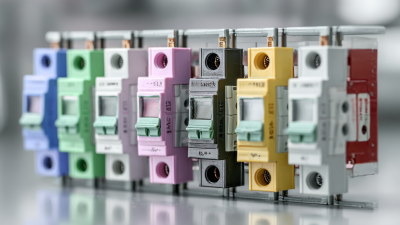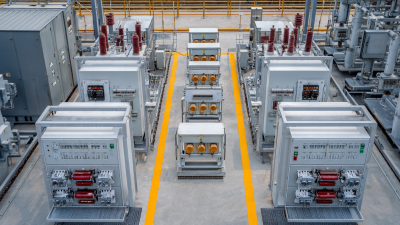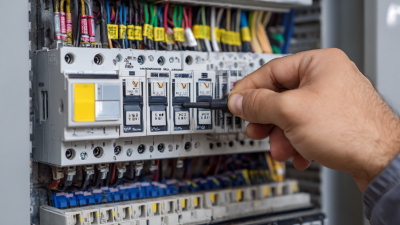How to Enhance Electrical Safety with Rccb Mcb Solutions
Table of Contents
- Understanding RCCB and MCB: The Fundamentals of Electrical Safety
- The Importance of Regular Testing and Maintenance for RCCB and MCB
- Key Features to Look for in High-Quality RCCB and MCB Solutions
- Tips for Proper Installation to Maximize RCCB and MCB Effectiveness
- Common Mistakes to Avoid When Using RCCB and MCB in Electrical Systems
- Best Practices for Educating Staff on Electrical Safety with RCCB and MCB
- FAQS
- Conclusion
- Related Posts
In today’s world, keeping electrical safety in check is more important than ever—whether you’re at home or running a business. As we depend more and more on various electrical appliances and systems, making sure everything's safe and secure is just a no-brainer. That’s where smart solutions like RCCB and MCB come in handy. These devices—Residual Current Circuit Breakers and Miniature Circuit Breakers—are pretty much the backbone of protecting our electrical setups from faults and overloads. Here at Zhejiang Cejia Electric Co., Ltd., we really get how vital these tools are for keeping things safe. With over 20 years under our belt in the industry, we’re dedicated to offering reliable energy storage power supplies, all while staying in tune with international standards. Our team’s experience means we can provide top-notch RCCB and MCB products at competitive prices, so you can rest easy knowing your home or business is safer and more protected.

Understanding RCCB and MCB: The Fundamentals of Electrical Safety
You know, RCCB (Residual Current Circuit Breaker) and MCB (Miniature Circuit Breaker) are pretty much essential when it comes to keeping electrical setups safe, whether it's at home or in a business. I read a report from the IEC in 2022 that estimated around 40% of fires in buildings worldwide are linked to electrical faults—that's quite a chunk! RCCBs are real lifesavers because they can detect earth faults and shut off the power really quickly, which helps prevent electric shocks. In fact, some studies suggest that using RCCBs can cut down fatal electric shocks by up to 70%. Pretty impressive, right?
On the other hand, MCBs are great for protecting circuits from overloads and short circuits. They automatically turn off when they sense too much current flowing through. The NFPA has said that when these are installed and maintained properly, MCBs can actually reduce the risk of electrical fires by more than half. When you combine RCCBs and MCBs, you create a solid safety barrier that not only keeps people safer but also helps prevent property damage from electrical issues. Honestly, making sure you understand and use these devices is super important, not just for safety but also to stay on the right side of regulations.
How to Enhance Electrical Safety with RCCB MCB Solutions
| Feature | RCCB (Residual Current Circuit Breaker) | MCB (Miniature Circuit Breaker) |
|---|---|---|
| Function | Protects against earth faults | Protects against overloads and short circuits |
| Current Ratings | Typically 30mA for personal protection | Typically 6A to 63A |
| Test Mechanism | Requires regular testing to ensure functionality | Self-resetting upon overload removal |
| Installation Location | Typically at the main electrical service panel | Located at various circuits throughout the system |
| Response Time | Less than 30 milliseconds | A few milliseconds depending on the rating |
| Application | Essential for enhanced safety in residential and commercial buildings | Commonly used in residential and industrial electrical systems |
The Importance of Regular Testing and Maintenance for RCCB and MCB
Keeping an eye on your Residual Current Circuit Breakers (RCCBs) and Miniature Circuit Breakers (MCBs) with regular testing and maintenance is super important for keeping your home or office safe. Did you know that nearly 30% of electrical accidents happen because these protection devices aren’t working quite right? That just goes to show how crucial it is to make sure they’re in tip-top shape. Doing routine inspections is like catching small issues early—before they turn into major problems—and that can really help reduce the risk of electrical faults causing trouble.
Also, it’s not just about testing regularly. Following your local electrical rules is a must. The Electrician's Management Association (EMA) points out that all electrical work should actually be done by Licensed Electrical Workers (LEWs). When you get professionals to handle inspections and maintenance, you not only boost safety but also help your devices last longer. That means fewer replacements and less hassle overall. Studies show that devices which get checked and maintained often tend to have fewer problems and work more reliably. So whether you’re a homeowner or managing a facility, it’s definitely worth making regular checks a priority. Trust me, it’s all about keeping things safe and smooth sailing in the long run.

Key Features to Look for in High-Quality RCCB and MCB Solutions
When you're choosing a good quality RCCB (that's your Residual Current Circuit Breaker) and MCB (Miniature Circuit Breaker), there are a few key features you really want to pay attention to if you want to keep things safe electrically. First off, make sure the devices are reliable when it comes to detecting currents and tripping automatically. A good RCCB should kick in quickly whenever there's an imbalance, shutting off the power to keep you safe from shocks. Same goes for MCBs — they need to be strong enough to handle overloads and short circuits, keeping your electrical system solid and secure.
Also, don’t forget to look at how these devices are built. High-quality RCCBs and MCBs are usually made from tough materials that can handle different environmental conditions without breaking down over time. Plus, features like adjustable settings can really come in handy because they make these devices more versatile for different situations. And of course, it’s super important to check if they meet the necessary safety standards—not just local ones but international ones too. That’s a good sign they’re reliable and will perform well when it really counts.
Tips for Proper Installation to Maximize RCCB and MCB Effectiveness
If you really want to get the most out of your RCCBs (Residual Current Circuit Breakers) and MCBs (Miniature Circuit Breakers), proper installation is a must. First off, make sure you pick the right devices for your specific electrical load and setup. For example, the MCB should match the current your load needs — no point in going too small or too big. And for the RCCB, it’s all about the earth fault protection you actually need based on your environment. Getting these choices right makes a big difference in keeping your place safer and helps avoid those annoying trips that happen when nothing’s actually wrong.
Then, when you're wiring everything up, take your time. Tighten all the terminals properly — don’t skimp! It’s easy to overlook, but loose connections can cause overheating or weird glitches. Also, double-check your wiring polarity; if that’s off, things might not work right at all. And hey, don’t forget about routine maintenance. Regular inspections and tests are your friends—they help make sure everything’s functioning like it should be. Following these tips isn’t just about following safety rules, it genuinely boosts the overall electrical safety at your home or workplace. Trust me, a little extra effort goes a long way!
Common Mistakes to Avoid When Using RCCB and MCB in Electrical Systems
When you’re setting up things like RCCBs (Residual Current Circuit Breakers) and MCBs (Miniature Circuit Breakers) in your electrical systems, it’s super important to avoid the usual mistakes—doing so can really improve safety and make things more reliable. One common slip-up? Not choosing the right rated current for your MCB. If you pick one that’s too high, it might not trip quickly enough during overloads, which isn’t great. But on the flip side, if it’s too low, it could trip unnecessarily, throwing a wrench in your plans and causing unnecessary interruptions. So, make sure your MCB’s rated correctly for your specific loads—that way, you've got a good balance between safety and smooth operation.
Another thing people often overlook is proper installation and routine checks. Many folks forget how important it is to test these devices regularly—especially RCCBs. Just a quick test every now and then can really give you peace of mind, making sure they’re actually working when you need them. If you don’t, there’s a risk you might think everything’s fine, but problems could be lurking. Also, always double-check that all wiring and connections are tight and follow the local electrical codes. Doing things right from the start not only makes these protective devices do their job better but also keeps your entire electrical system safe from risks like fires or shocks.

Best Practices for Educating Staff on Electrical Safety with RCCB and MCB
You know, teaching staff about electrical safety really matters when it comes to cutting down the risks of electrical problems. According to the folks at the Electrical Safety Foundation International (ESFI), almost 30% of all electrical fires happen because of faulty wiring or equipment. So, if companies invest in proper training — especially on how to use stuff like Residual Current Circuit Breakers (RCCBs) and Miniature Circuit Breakers (MCBs) — they can really lower those numbers. These devices are pretty essential because they cut off the power quickly when something's wrong, which helps prevent shocks and fires.
A good training program should walk employees through how RCCBs and MCBs work — not just what they do, but also how to spot electrical hazards and react in case of an emergency. I read a study from the National Fire Protection Association (NFPA) that said workplaces with regular safety drills saw about a 40% drop in electrical accidents. Hands-on stuff like workshops and simulations really helps people remember what to do and feel more confident handling safety issues. When businesses make safety a top priority and give clear instructions on using these circuit breakers properly, they’re not only protecting their team but also creating a safer overall work environment. It’s really about building that culture of safety, you know?
FAQS
: RCCBs (Residual Current Circuit Breakers) prevent electric shock by detecting earth faults and disconnecting circuits, while MCBs (Miniature Circuit Breakers) protect circuits from overloads and short circuits by automatically switching off when excess current is detected.
RCCBs can lower the incidence of fatal electric shocks by up to 70% by detecting earth faults quickly and disconnecting the circuit to minimize injury risks.
Properly installed and maintained MCBs can reduce the risk of electrical fires by over 50% by preventing overloads and short circuits.
Routine testing and maintenance are essential to ensure these devices function correctly, as nearly 30% of electrical accidents are linked to faulty circuit protection devices.
Common mistakes include choosing incorrect rated currents for MCBs, improper installation, and neglecting to perform periodic testing of these devices.
Electrical work should be carried out by Licensed Electrical Workers (LEWs) to ensure compliance with safety standards and local regulations.
RCCBs should be tested regularly to verify their functionality, as neglecting this can lead to a false sense of security and potential hazards.
It is essential to ensure that all wiring and connections are secure and comply with local electrical codes to guarantee the effectiveness of these devices.
Devices that undergo routine maintenance are less likely to develop faults and have higher reliability, thereby extending their lifespan and reducing overall replacement costs.
Choosing an MCB with a rating that is too high may provide inadequate overload protection, while a rating that is too low can cause unnecessary tripping and operational disruptions.
Conclusion
In this blog, we're diving into how you can boost electrical safety by using effective RCCB and MCB solutions. Honestly, understanding the basics of Residual Current Circuit Breakers (RCCB) and Miniature Circuit Breakers (MCB) is pretty important if you want your electrical systems to be safe and reliable. We also stress the importance of regular testing and maintenance — these little routines really make sure your devices stay in good shape. When choosing RCCB and MCB products, go for high-quality ones that come with the right features; they can make a big difference in safety. Plus, we’ve got some handy tips on installing these devices properly so you get the most safety out of them.
The blog doesn’t just stop there though — it also covers common mistakes folks tend to make when using RCCBs and MCs, and offers straightforward advice on how to avoid falling into those traps. We wrap things up with some best practices on how to educate your team about electrical safety, because the more everyone knows about the critical role these devices play, the better. Drawing on over 20 years of experience in the field, Zhejiang Cejia Electric Co., Ltd. is committed to providing top-notch RCCB and MCB solutions that meet international standards and — most importantly — keep people safe from electrical hazards.
Related Posts
-

7 Essential Tips for Choosing the Best Residual Circuit Breaker for Your Needs
-

Exploring the Advantages of Choosing the Best MCB and MCCB for Global Suppliers
-

The Ultimate Checklist for Sourcing the Best MCB Switches Worldwide
-

Unlocking Secrets to Source the Best Elcb Breaker Suppliers for Global Buyers
-

Essential Checklist for Choosing the Right Auto Recloser RCCB: Key Industry Metrics to Consider
-

Understanding Common Challenges Associated with Dc Mccb Installations

